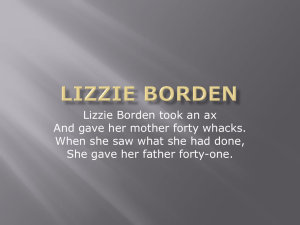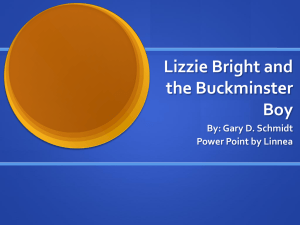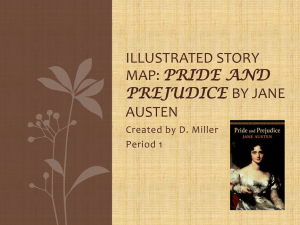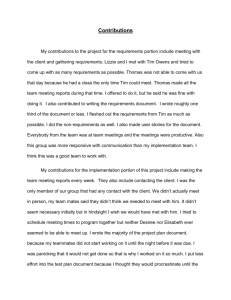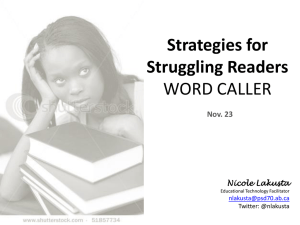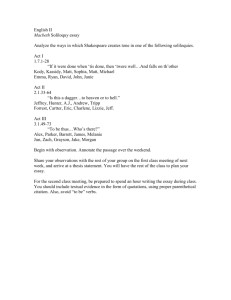table of contents
advertisement
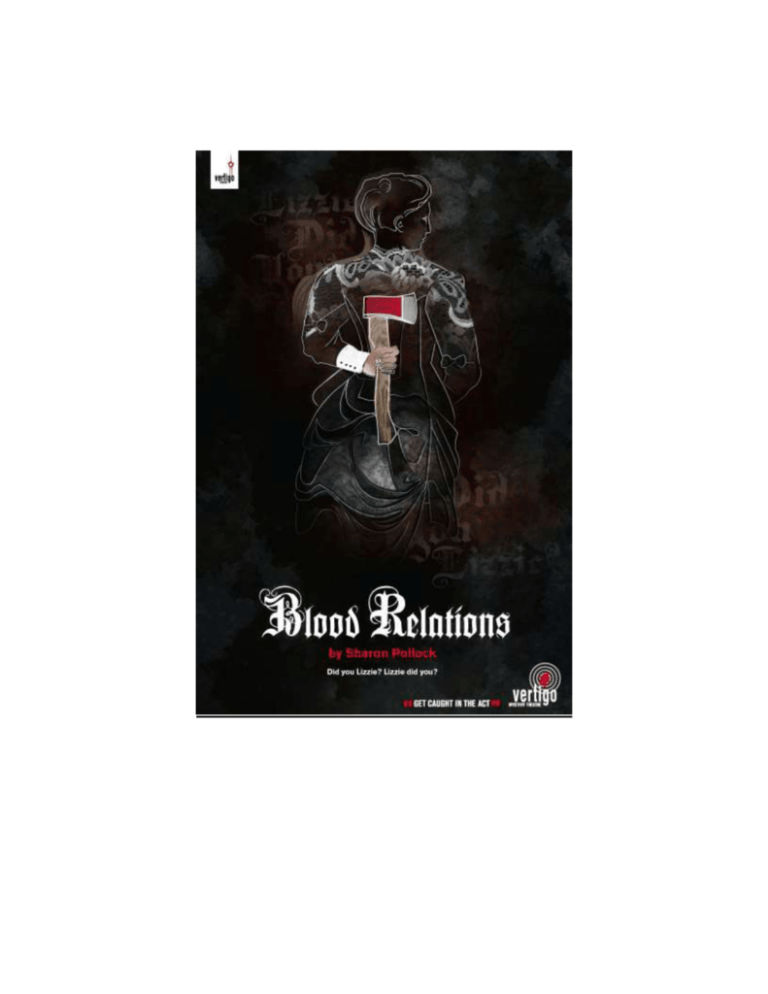
TABLE OF CONTENTS Credits page p. 3 Who Is Vertigo Theatre? p. 4 About Going to the Theatre p. 5 About the Playwright, Sharon Pollock p. 6 Interview with the Playwright p. 5 About the Play p. 10 Origins Characters Setting Playwright’s Production Note Plot Synopsis Historical context Pre-show Activities p. 14 Insight into Lizzie Borden Extra, Extra, Read All About It! A Woman’s Place Dream Thesis Post-show Activities p. 17 Did You, Lizzie – Lizzie, Did You? Small Town Gossip Is All Life Precious? Play Themes and Imagery Student Play Report Sponsor Information p. 20 Teacher Evaluation p. 21 Vertigo Theatre is committed to creating a welcoming atmosphere for schools and to assist teachers and parent chaperones with that process. It is our wish to foster and develop our relationship with our student audience members. It is our intention to create positive theatre experiences for young people by providing study guides and post-show “talk backs” with our actors and theatre personnel, in order to enrich students’ appreciation of theatre as an art form and enhance their enjoyment of our plays. 2 CREDITS PAGE The Cast Val Planche - Miss LIzzie / Bridget Jan Alexandra Smith - The Actress / Lizzie Robert Klein - Harry Wingate Heather Lea MacCallum - Emma Stephen Hair - Andrew Borden Valerie Ann Pearson - Abigail Borden Brian Jensen - Dr. Patrick / The Defense Creative Team Mark Bellamy – Director Scott Reid – Set & Lighting Design Michael Gesy – Sound Design Dietra Kaylan – Costume Design Marcie Januska - Stage Manager Heather Rycraft - Assistant Stage Manager Study Guide written by Roberta Mauer Phillips For Vertigo Theatre Suzanne Mott General Manager Mark Bellamy Artistic Director Nathan Pronyshyn Y Stage Producer WHO IS VERTIGO THEATRE 3 Vertigo Theatre operates out of Vertigo Theatre Centre and is located in the heart of downtown at the Calgary Tower. Housing two performing spaces, The Playhouse and The Studio, Vertigo Theatre produces a mystery series (Vertigo Mystery Theatre) and presents theatre-foryoung-audience productions from across the country (Y Stage). Vertigo Mystery Theatre is a unique opportunity for students to come together and engage in an entertaining theatrical experience that promotes problem solving. Appropriate for Junior and Senior High School students, Vertigo Mystery Theatre allows students to study the literature of authors such as Agatha Christie and J.B. Priestly while engaging in a shared cultural experience. Y Stage provides young audiences and adults alike an opportunity to investigate and rediscover our world. Y Stage is ideal for educating young people on the vast scope of theatre as we feature a wide variety of performance styles including physical theatre, mask, dance and spoken word. With five productions and an additional show aimed specifically at teens, Y Stage truly has something for students of all ages. 4 ABOUT GOING TO THE THEATRE Going to the theatre to see a play is a unique and wonderful experience. The sense of being “right there” in the characters’ lives, the exchange of energy between actors and audience, this cannot be found in front of television, films, computers, iPods or Blackberries. In the theatre, the audience shares what the actors on stage are doing by watching and listening. The actors on stage also respond to the audience and the way they are reacting to the performance. Some students may be coming to the theatre for the first time; others may need to be reminded of appropriate audience behavior. The following is offered in the hope that your students gain the most from their theatre experience. Stay with your group at all times and pay attention to your teachers, chaperones and theatre personnel. Once seated, stay put, watch and enjoy the play. If you absolutely must use the washroom during the performance, please exit the theatre quickly and quietly. You will be readmitted to the theatre at the discretion of the House Manager. Please do not stand up, walk around or put your feet on the seat or stage in front of you. Remember, this is “live” theatre. If you even whisper to someone beside you during the performance or in a blackout between scenes, you could disturb the concentration of the actors doing their jobs, or other audience members’ enjoyment of the play. Eating, drinking or chewing gum is not permitted in the theatre. Feel free to talk quietly before the show. When the houselights go down at the beginning of the play, this lets you know that we’re starting. It is at this moment that the actors and technical staff do their final preparation for the opening moment, so please let them do their work by being quiet and respectful. Laugh if it’s funny, cry if it’s sad, think, watch, listen, feel, respond, and, above all, applaud at the end. Let the actors and everyone else involved in the production know in the curtain call that you had a good time and appreciated their work. If you have a cell phone, iPod, iPhone, Blackberry, or any other electronic device, please make sure it is turned off or leave it with the Front of House Manager until the performance is over. If you feel the urge to text during the performance, just don’t out of courtesy to your fellow audience members and the performers. The use of cameras and recording devices in the theatre is strictly prohibited. At the end of the performance and “talk back”, please wait for the ushers to escort your group out of the theatre. Above all else, have a good time! 5 ABOUT THE PLAYWRIGHT, SHARON POLLOCK Pollock’s stage plays, over 20 in number, are produced throughout Canada and abroad. She writes for radio and television, has directorial credits at numerous theatres across the country, and has led playwriting and theatre workshops within and outside Canada. Her awards include a Canada Australia Literary Award for her body of work, a Nellie Award for National Radio Drama, a Golden Sheaf Television Award, and a Japan Foundation Award. She is the recipient of two Governor General’s Literary Awards for Drama (1981 BLOOD RELATIONS; 1985 DOC), was short-listed for the same award in 1986 (WHISKEY SIX CADENZA), and is a three time winner of the Gwen Pharis Ringwood Drama Award, most recently in 2008 for KABLOONA TALK. Since 2006 she has served as Dramaturge and artistic consultant with the Atlantic Ballet Company of Canada, and in Nov. 08 returned from Prishtina, Kosovo where she met with young Kosovar theatre artists and initiated, with Jeton Neziraj, artistic director of the Kosovo National Theatre, an ongoing project of collaboration, creation and exchange. Her reviews of Calgary theatre productions “Pollock on Plays” can be heard on CBC’s Homestretch. In October 09 she’s slated to appear on Vertigo’ Studio stage playing Emily Murphy in Calgary playwright Caroline Russell King’s HIGH AND SPLENDID BRAVERIES. During her 40+ years in professional theatre Pollock has served as Head of the Playwrights Colony at The Banff Centre of Fine Arts; the Associate Artistic Director of the Manitoba Theatre Centre, the Stratford Festival Theatre, and Theatre Calgary. She was the Playwright in Residence at the National Arts Centre; Alberta Theatre Projects; Theatre Calgary; and at Theatre Junction; Artistic Director of Theatre Calgary, Theatre New Brunswick, and of Calgary’s inner city storefront theatre, The Garry. INTERVIEW WITH THE PLAYWRIGHT What inspired you to write a play about Lizzie Borden? I began the play to see if I could force myself to write a naturalistic play that had unity of time and place with events occurring chronologically. That’s not my preferred structure, but I set myself the task mainly because my father always said that doing things you didn’t like to do was good for you. I thought it would be good for me to write in a form I didn’t care for; it would hone my craft somehow, like practicing scales on the piano. I choose Lizzie Borden as I’d read most, if not all, that was ever written about her in the English language, thus any research was already done. (It was a sort of leisure reading thing.) But once I got started Miss Lizzie took over (if that doesn’t sound too precious) and the characters, the story, and the way of telling it became something else altogether. 6 Unity of time, place and setting got the axe, and Miss Lizzie spoke across time and circumstance. I discovered as I wrote and rewrote that Miss Lizzie, though out of our time, could speak to our time. She spoke to me, and for me, and I could speak for her. Is BLOOD RELATIONS a feminist play? I dislike labels, and I would be better able to answer that question if I knew of a play labeled whatever the male equivalent adjective would be to “feminist”. I view labels like ‘feminist play” “gay play” “Asian Canadian play” as a way to set those plays lower, less universal, than plays that are not so labeled. Does anyone refer to DEATH OF A SALESMAN as a New York regional play? Or as a patriarchal play? BLOOD RELATIONS’ two leading roles are women’s roles and it deals with a woman’s inability to conform or accept the authority of her society or of her patriarchal family. It may resonate in a special way for some women just as DEATH OF A SALESMAN may resonate for some men. If a playwright’s intentions mean anything, I didn’t set out to write a feminist play. The character and the story engaged me because of the questions it raised; questions around character motivation and theatrical structure. Form and content. So I don’t call BLOOD REALTIONS a feminist play. What others call it is up to them. The play is set in 1902, ten years after Mr. and Mrs. Borden were murdered. You describe the flashbacks from 1892 as the “dream thesis” in which events are jumbled together, not necessarily in order. Why did you choose to structure BLOOD RELATIONS this way? I like the challenge of theatrically shuffling past, present, future, external locations, internal landscapes, inner thoughts and uttered words, while at the same time trying to ensure the play’s accessibility to an audience. I’m attracted to this kind of structure and form because I believe the way of telling a story contributes to the meaning of the story. The answer to “did she?” or “didn’t she?” held no fascination or motivation for me in writing the play. The ambiguity that surrounded those questions did. The playwriting question was how to weave ambiguity into the fabric of the play so that both the manner of weaving and what was woven (that being ambiguity) contributed to the overall meaning of the play. Lizzie Borden’s friendship with Boston actress Nance O’Neil suggested a structure, a way of telling that integrated ambiguity and played with the nature of theatre itself. An actress plays the role of Miss Lizzie who assumes the role of Bridget who watches (she’s an audience member within the play) as well as 7 participates in the action (as an actress playing the role of The Actress who assumes the role of Lizzie who watches (she’s also an audience member within the play) and participates in the action. The characters, Miss Lizzie and The Actress, are watched by individuals who have taken on the role of audience members when they entered the theatre and, as audience, participate in this act of theatre. (It’s like one of those boxes or figures that open to reveal a smaller box or figure that opens to reveal a smaller box or figure, and so on.) These multiple levels of role-playing enable or preserve the ambiguity of “did she?” or “didn’t she?” It’s a simple device in performance. But I believe it does create multi-levels of meaning within the story and deepens the relationship between the principal characters while expanding the realm of possibility of meaning and interpretation for theatre artists and for members of the audience. In addition, I intend the play’s structural elements to comment in a variety of ways on what has just occurred in the play thus enriching or increasing the possible meaning of the moment ex. a flashback introduced by a repeated phrase “The truth is 32 is too old to daydream” with “The truth is she’s spoiled rotten”; or two seemingly proper Victorian ladies dancing to Scott Joplin; or children’s voices as an old man’s murdered. Sometimes the comment is ironic, sometimes comic, sometimes it raises questions as to whether what we’ve regarded as the “truth” of a moment is really only one interpretation or point of view of that moment. I want these elements to enhance the audience’s sensory, emotional, and intellectual engagement with the play in performance. What is the truth about Lizzie Borden? If I really know that I wouldn’t have to write the play. BLOOD RELATIONS is an exploration of a possible truth. If recorded event is truth, and if the legal system reveals truth, she was acquitted of any crime. To me the evidence suggests that Bridget and Lizzie either committed the murders together, or either one of them committed the murders with the knowledge of the other. The fact that each of the women assured the innocence of the other by their testimony in court is interesting. At that time, the courts were more than ready to convict any Irish man or woman, particularly of the working class, of any crime on little evidence. Had Lizzie Borden said the word, Bridget would have been hanged faster than you can say, “took an axe”. The fact that Lizzie didn’t turn on Bridget, and that Bridget supported Lizzie’s version of events in court suggests a strong relationship between the two women (and possibly a financial pay-off for Bridget which is often suggested with no definitive proof.) What prompted you to move from acting to playwriting? I’d worked 7 years as an equity actor and had never been in a Canadian play. Canadian actors put on a variety of accents as they performed in plays from 8 other times and places. Our voices were silenced and stories seen through the lens of the Canadian experience went untold on our stages. I saw the making of theatre as a political and social act. Much as I often felt like making bombs in the basement it seemed a better idea to try to touch people’s emotions and engage their brains with theatre that entertained but hopefully stimulated certain questions about how we live our lives. So I turned to writing plays. You have countless awards and are revered as a playwright. What would you say your most significant accomplishment is? I hope I’m not revered. I think being revered is like being dead. Only worse because you’re still alive. I think my most significant accomplishment is surviving through the lush and the lean years, still writing, still learning, still trying to figure out why people do what they do, why the world is the way it is, why I am the way I am. What advice would you offer to student playwrights? Engage with life outside your own zone and circle. Keep writing. Don’t let that inner Voice of Judgment block creation. Learn from failure. Keep writing. 9 ABOUT THE PLAY Origins In 1976, Sharon Pollock’s play, MY NAME IS LIZABETH, was produced at the Vancouver Playhouse with Ms. Pollock playing the title role of Lizzie Borden. The revised version, BLOOD RELATIONS, premiered professionally at Theatre 3, Edmonton, Alberta, on March 12, 1980. It has since been produced at theatres across Canada, the United States, Australia and Japan. Characters Lizzie Borden is the play’s central character. She will play Bridget, the Borden family’s Irish maid in the flashback sequences. Ten years after the murder of her father and stepmother, a crime for which she was tried and acquitted, Lizzie lives with her sister, Emma. Stubborn and eccentric, Lizzie refuses to follow the prescribed rules for women in the late 1880’s, believing that people should be permitted to follow their own paths, regardless of what others think. The Actress is Lizzie’s friend and the two have an intense relationship. When she presses Lizzie for the truth about the murders, Lizzie proposes they play a game in which she will play Bridget, the maid, and the Actress will assume the role of Lizzie in the flashback sequences. Harry Wingate is Lizzie’s stepmother’s brother. He is a womanizer and a conniving businessman who tries to convince Lizzie’s father to hand over money and property to him and his sister. Emma Borden is Lizzie’s older sister who has raised her since their mother’s early death. Loving and meek, Emma does not understand Lizzie’s free-spirited ways. Andrew Borden is Lizzie and Emma’s father. As the man of the house, he is the one with all the decision-making power. When Lizzie is good and obedient, he treasures her; however, when she asserts herself and challenges him, he can be brutal. Abigail Borden is Lizzie’s stepmother. Since she married Mr. Borden, a widower with two young girls, her relationship with Lizzie has never been good. She is harsh and critical, telling Lizzie she must do what is expected – get married, move out and have her own family. Abigail is a scheming manipulator, just like her brother, Harry. Dr. Patrick, the Irish doctor, is a good friend to Lizzie. Sympathetic to Lizzie’s hopes and dreams, he is puzzled by her need for freedom. In the courtroom flashback sequences, he also plays the part of the Defense, arguing for Lizzie’s innocence. 10 Setting (playwright’s notes) The time is late Sunday afternoon and evening, late autumn, in Fall River, Massachusetts in1902; the year of the “dream thesis,” if one might call it that, is 1892. The playing areas include (a) within the Borden house: the dining room from which there is an exit to the kitchen; the parlour; a flight of stairs leading to the second floor; and (b) in the Borden yard: the walk outside the house; the area in which the birds are kept. Production Note (as described in the script) Action must be free-flowing. There can be no division of the script into scenes by blackout, movement of furniture, or sets. There may be freezes of some characters while other scenes are being played. There is no necessity to “get people off” and ”on” again for all the characters, with the exception of the Actress and Miss Lizzie (and Emma in the final scene) are imaginary, and all action in reality would be taking place between Miss Lizzie and the Actress in the dining room and parlour of her home. The Defense may actually be seen, may be a shadow, or a figure behind a scrim. While Miss Lizzie exits and enters with her Bridget business, she is always a presence, often observing unobtrusively as “herself”, when as Bridget she takes no part in the action. Plot The play takes place on a late Sunday afternoon and evening in 1902, Fall River, Massachusetts. Miss Lizzie and the Actress are in the parlour of the Borden house. They clearly have a close relationship. As they talk about the Actress’s glamourous life in the theatre world in Boston, the Actress reports that some kids playing skip rope behind the theatre were singing, “Lizzie Borden took an axe, Gave her mother forty whacks. When the job was nicely done, She gave her father forty-one.” The Actress then presses Lizzie to tell her the truth about the murders of her father and step-mother, “Did – you – Lizzie – Lizzie – did - you?” Even though Miss Lizzie had been acquitted, the truth has remained ambiguous. Miss Lizzie proposes that they play a re-enactment game in which the Actress will play her, and Lizzie will play Bridget. The flashback “dream thesis” sequences begin with Lizzie’s trial that took place ten years before in 1892. The Defense questions Lizzie as Bridget, who describes the Borden family and a visit from Harry, Mrs. Borden’s brother. Harry inappropriately talks to Bridget as if she were a sexual object. It also becomes clear that the purpose of his visit is to convince his brother-in-law, Mr. Borden, to sign over more money and property to either him or his sister. Lizzie appears and Harry leaves to split wood. He knows Lizzie is on to his financial schemes. Emma, Lizzie’s older sister appears. When Lizzie wants to talk with her about the purpose of Harry’s visit, Emma does not want to deal with the reality of the family farm, which is in financial ruin, or Harry’s schemes to get his hands on what should be their inheritance. 11 Mrs. Borden comes down for breakfast and Lizzie leaves to feed her beloved pigeons in the shed. It is clear there is no love lost between them. Mrs. Borden refers to Lizzie as spoiled and unladylike. When Mr. Borden appears and is questioned by Emma about the purpose of Harry’s visit, he tells her it is none of her business. He changes the subject to the widower, Johnny MacLeod, who is interested in Lizzie, insisting that Emma tell Lizzie about it. Emma leaves in a huff, refusing to be the family mediator and taking the abuse for it. The scene shifts to Lizzie and Dr. Patrick talking flirtatiously outdoors. When he jokingly suggests that Lizzie run away from home, she invites him to run off with her, even though he is married. Their fun is interrupted by the appearance of Harry, who tells Lizzie it’s time for lunch. Lizzie ignores him. Harry then reports to Mr. and Mrs. Borden that Lizzie has been flirting with the doctor. He and Mrs. Borden gang up on Mr. Borden, saying he can’t control his own daughter. He says, “…the truth of the matter is, if Lizzie puts her mind to a thing, she does it, and if she don’t, she don’t.” Finally, Mr. Borden says he’ll talk to her. Back in the courtroom, Lizzie expresses how she has always felt she was born without “a magic formula for being a woman … I was born … defective.” The Defense returns. “Do you believe Lizzie Borden capable of these acts? I can tell you I do not!!” Mr. Borden tries to persuade Lizzie to see the widower MacLeod. Lizzie knows he also has three small boys, arguing, “He’s looking for a housekeeper not a wife.” She does want to leave the house, but refuses to get married to do it. Mr. Borden scoffs at her idea of learning to keep the books at his office. The confrontation escalates with Mrs. Borden goading Lizzie as well, ending with Mr. Borden slapping Lizzie and sending her to her room. Lizzie overhears Harry’s business with her father. Harry wants the fallow farm put in Mrs. Borden’s name and leased to him. He will conduct horse auctions and buggy rides on the property, giving Mr. Borden twenty per cent. When Harry leaves, Lizzie confronts her father. His rage erupts and he directs it at Lizzie’s beloved pigeons, killing them with an axe. Act One ends back in 1902, with Lizzie saying that she loved her pigeons. Act Two returns to Lizzie and the Actress’s 1892 re-enactment. It is the following day. When Emma tells Lizzie she is going away for a few days, Lizzie accuses her of running away from reality. She explains that with the farm being signed over to their stepmother, they will be cut out of their father’s will and left with only a small monthly allowance. Emma leaves with Lizzie saying, “I want to die, but something inside won’t let me … inside something says no.” Mr. and Mrs. Borden and Harry come down for breakfast and Harry and Mr. Borden plan to go to town to conduct business, after which Harry plans to leave. 12 Lizzie, knowing their plan to sign the papers in town, unsuccessfully begs her father not to go. The scene fades to another talk between Dr. Patrick and Lizzie. They have a peculiar conversation about whom he would save if he could only save one of two people dying in an accident – an old person or a young person, a bad person or a good person. Lizzie accuses the doctor of not making decisions because he’s a coward. She states, “I’m not a coward!!” Back at home, Lizzie talks to Mrs. Borden about her father killing her birds with an axe. Uncomfortable, Mrs. Borden goes upstairs, carrying a basket of Lizzie’s clean clothes. Lizzie follows, describing how she would kill someone as they exit. The scene changes and Mr. Borden is home. Lizzie, telling him how much she loves him, helps him get comfortable and encourages him to take a nap. When he’s asleep, Lizzie approaches him with a hatchet as the stage darkens. Back in 1902, the Actress moves into the shadows as Emma confronts Lizzie about their disgraceful relationship. Emma again asks Lizzie if she committed the murders ten years before. Threatening her with “something sharp”, Lizzie states that if she is guilty, Emma is as well since she raised her and taught her everything. The play ends with the Actress deciding Lizzie really did commit the murders. Lizzie replies, “I didn’t. You did.” Historical Context: Lizzie Borden On August 4, 1892, Lizzie Borden discovered her father’s body in a downstairs room of the family house. She called upstairs to Bridget Sullivan, the family’s maid, to inform her. Later, while neighbours attended to Borden, Sullivan discovered the body of Lizzie’s stepmother. Both victims had been killed by multiple blows with a hatchet, and although a broken hatchet was found by investigators in the basement of the house, the hatchet was never proven to be the murder weapon. In the absence of other evidence, such as bloody clothing or a murder weapon, the jury acquitted Lizzie Borden after one hour’s deliberation. The notoriety of the murders and trial led to speculation in the following years about who the murderer really was. 13 PRE-SHOW ACTIVITIES Insight into Lizzie Borden Sharon Pollock has created a complex, conflicted woman in the character of Lizzie Borden in BLOOD RELATIONS. Lizzie longs to escape the confines of society and her family’s expectations, yet she is trapped in the cage of her life. Examine the following script excerpt for an insight into one side of Sharon Pollock’s Lizzie Borden. MR. BORDEN: You resemble your mother. LIZZIE: I look like my mother? MR. BORDEN: A bit like your mother. LIZZIE: But my mother’s dead. MR. BORDEN: Lizzie – LIZZIE: I remember you told me she died because she was sick … I was born and she died … Did you love her? MR. BORDEN: I married her. LIZZIE: Can’t you say if you loved her? MR. BORDEN: Of course I did, Lizzie. LIZZIE: Do you hate me for killing her? MR. BORDEN: happened. You don’t think of it that way, it was just something that LIZZIE: Perhaps she just got tired and died. She didn’t want to go on, and the chance came up and she took it. I could understand that … Perhaps she was like a bird, she could see all the blue sky and she wanted to fly away but she couldn’t. She was caught, Papa, she was caught in a horrible snare, and she saw a way out and she took it … Perhaps it was a very brave thing to do, Papa, perhaps it was the only way, and she hated to leave us because she loved us so much, but she couldn’t breathe all caught in the snare … Extra, Extra, Read All About It! 14 The New York Times headline for August 5th, 1892 read: “ BUTCHERED IN THEIR HOME: Mr. Borden and His Wife Killed in Broad Daylight.” The first paragraph read: FALL RIVER, Mass., Aug. 4 – Andrew J. Borden and his wife, two of the oldest, wealthiest, and most highly respected persons in the city, were brutally murdered with an ax at 11 o’clock this morning in their home on Second Street, within a few minutes’ walk of the City Hall. The Borden family consisted of the father, mother, two daughters, and a servant. The older daughter has been in Fair Haven for some days. The rest of the family has been ill for three or four days, and Dr. Bowen, the attending physician, thought they had been poisoned. In 2009, a newspaper account of such a horrific crime would be shocking; in the early 1890’s, they were unfathomable. And the idea that the murderer could possibly be Borden’s daughter, Lizzie, took days to register with the police despite all the evidence that pointed directly to her. How could a woman of her upbringing possibly commit such a heinous crime? Interpretations of true events can inspire fascinating art, which can take many forms. A few examples are the song, American Pie, about the death of Buddy Holly; Picasso’s painting, Guernica, depicting a war crime; the books In Cold Blood, Helter Skelter and A Mighty Heart; the films, Dillinger, Bonnie and Clyde and The Assassination of Jesse James; and, of course, the play, BLOOD RELATIONS. What recent or current events do you find interesting enough to inspire an artistic interpretation? Work individually or in groups to create musical compositions, movement/dance pieces, poems, artwork, stories, videos or theatrical scenes based on events that pique your curiosity and interest. A Woman’s Place Isabella Mary Beeton (1936 – 1865) was the English author of Mrs. Beeton’s Book of Household Management. This book is referred to in BLOOD RELATIONS as a resource for questions of etiquette and the role of women. In the preface, Mrs. Beeton explains why she wrote the book: “I have always thought that there is no more fruitful source of family discontent than a housewife’s badly cooked dinners and untidy ways. Men are now so well served out-of-doors, at their clubs, well-ordered taverns, and dining houses, that in order to compete with the attractions of these places, a mistress must be thoroughly acquainted with the theory and practice of cookery, as well as be perfectly conversed with all the other arts of making and keeping a comfortable home.” Presenting a contemporary man’s point of view in the play is Lizzie Borden’s stepmother’s brother, Harry in conversation with Lizzie’s father: “Now Andrew, I’ve spent my life raisin’ horses and I’m gonna tell you somethin’ – a woman is 15 just like a horse! You keep her on a tight rein, or she’ll take the bit in her teeth and the next thing you know, road, destination, and purpose is all behind you, and you’ll be damn lucky if she don’t pitch you right in a sewer ditch!” In the 21st century, it may appear that the role of women has changed drastically since Victorian times; however, there are still cultures in which men demand obedience from women. The following quote is from Nance O’Neil, an American actress of stage and silent movies in the early 20th century, on whom the character of the Actress in BLOOD RELATIONS is based. Use the quote as the basis for a class discussion or debate on the topic: “Tradition has made women cowardly.” Dream Thesis Sharon Pollock has called Lizzie’s re-enactment of the 1892 murders ten years prior the “dream thesis.” The play avoids realism and defies logical time progression. There aren’t clear entrances and exits. The actors weave in and out of the present and the past. There are three real characters on stage, Lizzie, her sister Emma and the Actress. The others are pulled up from memories of the 1892 event. This gives the scenes with Mr. Borden, his wife, her brother Harry, and Dr. Patrick a hazy, hallucinatory quality; they are the ghosts of Lizzie’s memory. Our own dreams can be ambiguous, random and bizarre. Sometimes when we awaken from a particularly vivid dream, it can initially be difficult to differentiate between what is real and what is not. In small groups, brainstorm to come up with stories of the strangest dream you could ever imagine. You may wish to share dreams you have actually had, or create your own dream story. Write your stories down and then present them to the other groups using your voices to “paint the word pictures” as dramatically as possible. 16 POST-SHOW ACTIVITIES Did You, Lizzie – Lizzie, Did You? Did Lizzie Borden, in fact, murder her father and stepmother? On the basis of the play you have seen, Sharon Pollock’s take on the subject, and further research you may be interested in doing, what do you think? Did she get away with murder? According to some some sources, Lizzie was the only suspect, with means, motive, and opportunity. What ended up saving her was the horrendous violence of the murders. The possibility of such a civilized, well-brought up, middle class woman hacking two people to death was unthinkable. After only one hour of deliberation, the all-male jury found Lizzie Borden not guilty. What if the play, BLOOD RELATIONS, ended with Lizzie confessing to the Actress and her sister, Emma? Using what you have learned when you saw the play and perhaps did your own research, compose and perform Lizzie’s confession monologue. Small Town Gossip Lizzie Borden was acquitted in the courtroom but not in her town of Fall River where she was ostracized. No one wanted anything to do with her. Create scenes based on how you think the local townspeople of Fall River might have reacted in the days during her trial and subsequent acquittal. Would the male and female perceptions be similar or different? What might people be saying? Create two different conversations – in the dress goods store where the women have gathered, and in the lunchroom of the mill where the men work. Keep the scenes to no more than four characters and try to present as many points of view as possible. Is All Life Precious? Think back to the scene near the end of the play in which Lizzie says the following to her stepmother: “Did you know Papa killed my birds with the axe? He chopped off their heads. It’s alright. At first I felt bad, but I feel better now. I feel much better now …. I am a woman of decision, Mrs. Borden. When I decide to do things, I do them, yes, I do. How many times has Papa said --- when Lizzie puts her mind to a thing, she does it --- and I do …. It’s always me who puts the slug poison out because they eat all the flowers and you don’t like that, do you? They’re bad things, they must die. You see, not all life is precious, is it? What did you think would occur in the story after that point in the play? Is all life precious? What did you think when Lizzie asked Dr. Patrick if he could only save 17 one of two people injured and dying in an accident would he choose the bad person or the one trying to be good? What are the ethics of this dilemma? If you were a doctor, what would you do? Do you recall any other moments in the play in which the question “is all life precious?” is explored? Play Themes and Imagery What would you say are the main themes in the play, BLOOD RELATIONS? What predominant images do you recall that may have been used to illustrate those themes? For example, why are the pigeons important in the story? What does the hatchet represent? Do you recall any other images that contributed to the rich tapestry of this play, either in the lines spoken or any technical aspects such as lighting, music or sound? The next time you attend a play, read a book or poem, see a film, or visit an art gallery, try to pay specific attention to the imagery. Often that is where the emotional connection to the work is found. True art speaks to the hearts, souls and minds of its audience. Student Play Report We would love to know what your students thought of our production of BLOOD RELATIONS. Please encourage them to write and send us copies of their play reports. If they wish to be entered into a draw to receive 2 tickets to one of our upcoming productions, they must include the following: First name Last name initial only Grade School name Teacher contact name School phone number Date of the performance attended Please fax to 403-263-1611or email play reports to nathan.pronyshyn@vertigotheatre.com Once the draw is done, we will contact the teacher and the school to let the student know. The winning student may then get in touch with us regarding how and when to pick up the tickets. You may have your own format for student play reports. If not, may we suggest the following be included: First name, school, and when you attended Vertigo Theatre’s production of BLOOD RELATIONS. 18 Have you attended any other live theatre performances before? Did you know anything about the play before you saw it? What were you expecting? Did the production meet your expectations? Was there anything in the play you did not quite understand? Was each character believable, or was there something that didn’t ring quite true for you? If you could play one of the characters, which would you choose and why? Did each of the technical elements – set, costumes, lighting, sound, music, special effects, enhance or detract from the production for you? What do you think you’ll remember most about the play and why? What message do you think the playwright meant to convey in this play? If you could change anything about the production, what would it be? Would you recommend that your friends and family go out and see this production? Note: If you or your students are interested in finding out more about Vertigo Theatre, please visit our web site at www.vertigotheatre.com where you may also sign up for our e-newsletter. 19 Evaluation Form Your Feedback is very important to us! Our series are growing rapidly and the information you provide will help us to determine future programming, booking procedures and educational content. Return by fax to 403-263-1611. Thank you for helping us continue improving our series! SHOW: TEACHER NAME: SCHOOL: GRADE: Please rate the following from 1-10 (1=Poor, 5=Good, 10=Excellent) 1) Booking Procedure (poor) 1 2 3 4 5 6 7 8 9 10 (excellent) Comments: 2) Affordability & Accessibility (Price, Bussing, etc) Comments: 4) Show Start Times & Performance Duration 1 2 3 4 5 6 7 Comments: 8 9 10 5) Study Guide Material 1 2 3 Comments: 7 8 9 10 6) Production Value (Set, Costume, Props etc.) 1 2 3 4 5 6 7 Comments: 8 9 10 4 5 6 7) Educational Value: (Was the production successful as a learning experience for your students?) 1 2 3 4 5 6 7 8 9 10 Comments: 8) Entertainment Value (Did the production engage your Students?) 1 2 3 4 5 6 7 8 9 10 Comments: 9) Overall Experience 1 2 3 Comments: 4 5 6 7 8 9 10 General Feedback and suggestions: 20

